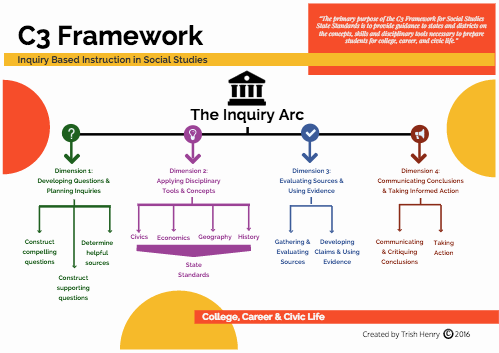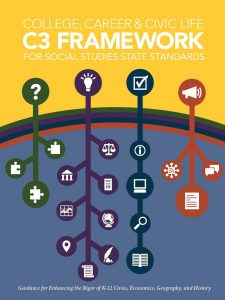C3 Framework and Inquiry-Based Learning
College, Career, and Civic Life (C3) Framework for Social Studies State Standards: Guidance for Enhancing the Rigor of K-12 Civics, Economics, Geography, and History
The result of a three year state-led collaborative effort, the College, Career, and Civic Life (C3) Framework for Social Studies State Standards was developed to serve two audiences: for states to upgrade their state social studies standards and for practitioners — local school districts, schools, teachers and curriculum writers — to strengthen their social studies programs. Its objectives are to: a) enhance the rigor of the social studies disciplines; b) build critical thinking, problem solving, and participatory skills to become engaged citizens; and c) align academic programs to the Common Core State Standards for English Language Arts and Literacy in History/Social Studies.
In June 2017, a Religious Studies Companion Document was added as a Supplement to the C3 Framework. It is included in the downloadable pdf file of the Framework.
-National Council for the Social Studies

The Inquiry Arc
NCSS Guidance on the C3 Framework and the Four (4) Dimensions of the Inquiry Arc
Dimension 1 : Developing Questions and Planning Inquiries
Dimension 2 : Applying Disciplinary Concepts and Tools
Dimension 3 : Evaluating Sources and Using Evidence
Dimension 4: Communicating Conclusions and Taking Informed Action
Inquiry-Based Learning
One of the latest and most promising instructional shifts in social studies education is towards inquiry-based learning. With its roots found in John Dewey’s, among others, philosophy that students learn best while doing, inquiry-based learning seeks to build on the natural curiosity of students and engage their problem solving skills, while accessing personal experiences to make informed and well-supported opinions about the world in which they live. To quote Brazilian educator, advocate, and philosopher Paulo Freire, an inquiry education “provoke[s] the discovering of need for knowing and never to impose the knowledge whose need was not yet perceived”.* By clicking on the following names of education related groups and organizations, you will be taken to websites that provide inquiry-based and open educational resources.
UMBC Center for History Education
*Bell, B., Gaventa, J., & Peters, J. (Eds). (1990) We make the road by walking: Conversations on education and social change: Myles Horton and Paulo Freire. Philadelphia, PA: Temple University Press.




